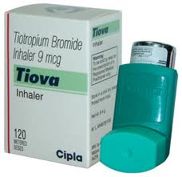What is Tiova Inhaler 9mcg?
Tiova Inhaler 9 mcg is a medication containing tiotropium bromide, a long-acting anticholinergic bronchodilator used to manage chronic obstructive pulmonary disease (COPD). It helps relax and widen the airways in the lungs, making it easier to breathe.
Administered via inhalation, this medication aids in reducing symptoms like shortness of breath, wheezing, and coughing in COPD patients. Tiova Inhaler is typically prescribed for long-term maintenance treatment and is not meant for sudden relief during an acute COPD attack.
It's crucial to follow the prescribed dosage and usage instructions provided by a healthcare professional to achieve optimal benefits.
Uses of Tiova Inhaler
Tiova Inhaler, containing tiotropium bromide, is primarily used for the long-term management of chronic obstructive pulmonary disease (COPD). It helps alleviate symptoms such as shortness of breath, wheezing, and coughing associated with COPD by relaxing and widening the airways in the lungs.
This medication is not intended for rapid relief during acute COPD exacerbations but is rather prescribed as a maintenance treatment to improve lung function and quality of life for individuals with COPD. Always follow the prescribed dosage and directions provided by a healthcare professional for effective and safe use of Tiova Inhaler.
Benefits
The benefits of using Tiova Inhaler include:
- Improved Breathing: Tiova helps widen the air passages in the lungs, making it easier to breathe for people with COPD.
- Reduced Symptoms: It helps alleviate symptoms like shortness of breath, wheezing, and coughing associated with COPD, improving overall quality of life.
- Long-term Management: As a maintenance treatment, it helps control COPD symptoms over the long run, reducing the frequency and severity of flare-ups.
- Enhanced Exercise Tolerance: By improving lung function, Tiova Inhaler can aid in increasing exercise tolerance for individuals with COPD.
- Prevention of Disease Progression: Regular use of Tiova Inhaler may slow down the progression of COPD and prevent further damage to the lungs.
How does Tiova Inhaler (tiotropium bromide) work?
Tiotropium bromide Inhaler contains tiotropium bromide, which belongs to a class of medications called anticholinergics. It works by targeting specific receptors in the airways of the lungs known as muscarinic receptors.
When inhaled, tiotropium blocks these receptors, preventing the action of a neurotransmitter called acetylcholine. This action causes the muscles around the airways to relax, leading to the dilation or widening of the air passages.
By relaxing the muscles and widening the airways, Tiova helps improve airflow into and out of the lungs. This makes it easier for individuals with COPD to breathe, reducing symptoms like shortness of breath, wheezing, and coughing associated with the condition.
How to use it?
Using Tiova Inhaler typically involves these steps:
- Prepare the Inhaler: Remove the cap and shake the inhaler well. Check the mouthpiece to ensure it's clean and clear.
- Prime the Inhaler (if needed): If it's the first time using the inhaler or if it hasn't been used for a few days, release a test spray into the air to prime it. Follow the specific instructions provided with the inhaler.
- Breathe out: Exhale fully, away from the inhaler.
- Inhale the Medication: Seal your lips around the mouthpiece without covering the air vents. Breathe deeply and steadily through your mouth, pressing down on the inhaler to release the dose while continuing to inhale.
- Hold Breath: After inhaling, hold your breath for about 10 seconds or as long as comfortable.
- Exhale Slowly: Breathe out slowly and gently away from the inhaler.
- Rinse Mouth (if advised): If mouth dryness or irritation occurs, rinse your mouth with water after using the inhaler.
- Close the Inhaler: Replace the cap to keep the inhaler clean.
Always follow the specific instructions provided with your Tiova Inhaler and consult a healthcare professional for guidance on the correct usage technique.
Tiova Inhaler Side Effects
Tiova inhalers, like any medication, can cause side effects, although not everyone experiences them. Common side effects may include:
- Dry Mouth: This is one of the most reported side effects.
- Throat Irritation: Some users may experience irritation or soreness in the throat.
- Headache: Occasional headaches have been reported.
- Cough: A mild cough might occur, especially at the beginning of using the inhaler.
- Dizziness: Feeling dizzy or lightheaded can happen in some cases.
- Blurred Vision: Rarely, some individuals may experience temporary vision changes.
- Urinary Retention: Difficulty in passing urine may occur, particularly in individuals with a history of prostate problems.
Serious side effects are rare but can include allergic reactions (rash, itching, swelling), difficulty breathing, or rapid heartbeat. If you experience any severe side effects or allergic reactions, seek immediate medical attention.
Precautions
Here are some precautions to consider while using Tiova Inhaler:
- Allergies: Inform your healthcare provider about any allergies to tiotropium or similar medications before using Tiova Inhaler.
- Medical History: Discuss your medical history, especially conditions like glaucoma, urinary problems, kidney disease, or any heart-related issues, with your doctor.
- Pregnancy and Breastfeeding: Notify your doctor if you are pregnant, planning pregnancy, or breastfeeding. The use of Tiova Inhaler during these periods should be discussed and evaluated based on potential risks and benefits.
- Interactions: Inform your healthcare provider about all medications, including prescription, over-the-counter, herbal supplements, and vitamins, to avoid potential interactions with the Tiotropium bromide Inhaler.
- Usage Precautions: Follow the prescribed dosage and usage instructions carefully. Do not exceed the recommended dose without consulting your healthcare provider.
- Avoiding Contact with Eyes: Ensure that the inhaler does not come into contact with your eyes. If accidental contact occurs, rinse thoroughly with water.
- Not for Rescue Use: Tiotropium bromide Inhaler is a maintenance medication and should not be used for sudden COPD attacks. Have a rescue inhaler prescribed by your doctor for acute breathing problems.
- Regular Follow-ups: Attend regular check-ups with your healthcare provider to monitor the effectiveness of the medication and any potential side effects.
Interactions
Tiova Inhaler can interact with various medications and substances. Some interactions to be aware of include:
- Other Anticholinergic Medications: Using Tiotropium bromide inhalers with other anticholinergic drugs may increase the risk of side effects.
- Medications for Urinary Issues: Some medications used for urinary problems or bladder conditions might have interactions with Tiova Inhaler, potentially causing increased side effects like urinary retention.
- Certain Antibiotics: Specific antibiotics, particularly from the quinolone class, may interact with Tiova Inhaler, leading to an increased risk of side effects.
- Beta-Blockers: Combining Tiova Inhaler with certain beta-blocker medications might cause an increased heart rate or changes in blood pressure.
- Diuretics: Some diuretic medications might interact with Tiotropium bromide inhalers, potentially altering the balance of electrolytes in the body.
- Avoid Smoking: Smoking while using Tiova Inhaler may decrease its effectiveness. Quitting smoking or avoiding exposure to tobacco smoke can help improve the benefits of the medication.
Frequently Asked Questions
What is Tiova Inhaler used for?
Tiova Inhaler contains tiotropium and is primarily used for the long-term management of chronic obstructive pulmonary disease (COPD). It helps improve breathing and reduce symptoms like shortness of breath, coughing, and wheezing.
How does Tiova Inhaler work?
Tiova contains an anticholinergic medication that relaxes the muscles in the airways, helping to widen them and make breathing easier for individuals with COPD.
How do I use Tiova Inhaler?
Typically, Tiotropium bromide Inhaler is used once a day. The user breathes in the medication through the mouthpiece after exhaling fully, following the specific instructions provided with the inhaler.
What are the side effects of Tiotropium bromide inhalers?
Common side effects may include dry mouth, throat irritation, headache, cough, dizziness, and sometimes urinary difficulties. Serious side effects are rare but can include allergic reactions or vision changes.
Can I use Tiova Inhaler if I'm pregnant or breastfeeding?
It's crucial to discuss the use of Tiova Inhaler with a healthcare provider if pregnant, planning pregnancy, or breastfeeding. They can weigh the potential risks and benefits before recommending its use.
Are there any precautions while using Tiova Inhaler?
Yes, precautions include informing your doctor about allergies, medical history (especially related to glaucoma or urinary problems), and potential drug interactions. It's important to follow dosage instructions carefully.
Can I use Tiova Inhaler for sudden COPD attacks?
No, Tiova Inhaler is a maintenance medication and should not be used for rapid relief during sudden COPD exacerbations. A separate rescue inhaler prescribed by a doctor should be used for acute breathing problems.
What should I do if I miss a dose of Tiova Inhaler?
If you miss a dose, take it as soon as you remember. However, if it's close to the next scheduled dose, skip the missed one and continue with your regular dosing schedule. Avoid taking double doses to compensate for a missed one.
Conclusion
Tiova Inhaler, containing tiotropium, serves as a vital tool in the management of chronic obstructive pulmonary disease (COPD). By relaxing the muscles in the airways, it aids in improving breathing and reducing distressing symptoms like shortness of breath and coughing.
Your review is submitted successfully. It will be live after approval, and it takes up to 24 hrs.







